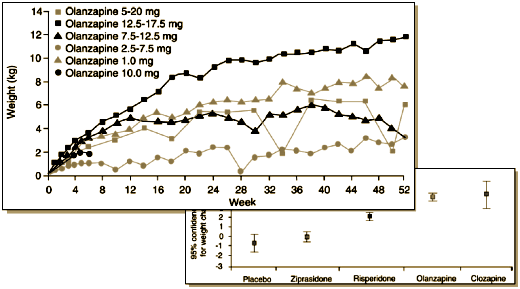Right now, I’m treating an adolescent schizophrenic boy with Zyprexa®. We started with Risperdal, but he had no response to doses I was comfortable with, so he was changed to Haldol, and he did respond. It’s a hard case, because the kid himself is not just schizophrenic – he’s a natural-born contrarian who wouldn’t admit to being better if his life depended on it. So we have to follow other signs – those primary symptoms that Bleuler laid out for us long ago. There is one symptom he will report with accuracy, auditory hallucinations. So we have that to go on. Then he had a very public extrapyramidal reaction at a family gathering and he and his parents went terminally sour on Haldol. That was my error. I usually don’t start Cogentin if there’s no clinical need. In this case, knowing his family, I should’ve started it on day one. I had warned them of the possibility of EPS, but the reality was too much for them. So they doctor-shopped for a while among the available Primary Care Physicians where he was treated with Zoloft, later Wellbutrin, and things didn’t go very well at all. So they came back after another trip to the hospital. I knew I had only one shot, and it mattered because when psychotic, this kid is suicidal in frightening, acting out ways.
So I picked Zyprexa® based on CATIE’s efficacy curve, lower EPS in the European Schizophrenia study, and the fact that this kid is a beanpole. He responded at 10mg and is currently not psychotic. He has negative symptoms sure enough, doing nothing in his life although he’s a smart guy; he is still a contrarian; but he’s not captured in the throes of psychosis. In the process of things, we learned that his medication compliance earlier was at best spotty. At present, his parents have joined in the taking medicine project, and non-compliance is not currently a problem. Thus far, weight gain is not an issue.
They are uninsured and the cost of Zyprexa® is a big problem. They applied to Lilly for help, and received a one year’s worth of medicine free – renewable quarterly. He’s being followed weekly by a talented therapist and I see him monthly. He’s anything but solidly on the "road of life," but he’s at least not jumping off of a cliff. Our plan is to decrease his dose in a few months if possible and to be as "psychosocial" as possible, hopefully getting him into the world of people other than just his girlfriend – herself in a pile of treatment elsewhere. This young man was hospitalized twice for having specific suicidal plans revealed by his friends and his girlfriend. The option of letting nature take its course here just wasn’t in the picture.
It’s the best we can do right now. I’m glad that the Zyprexa® was around to use, and appreciative of Lilly’s generosity in the face of the family’s need. This is what their drug is for. I’m vocal about the drug’s limitations, about Lilly’s shameful marketing campaign, and their active suppression of the reality and magnitude of the metabolic syndrome. This drug is no all-purpose psychiatric panacea, but it is a perfectly viable option when it’s a viable option considering the diagnosis and the case at hand.
Much of medicine is like this, a trade-off, a compromise, varying levels of risky business. Being wrong is one thing. Being wrong when you’re deprived of information that would inform making the tradeoffs involved in most clinical decisions is an entirely different matter. In the cases that are covered here and plenty of other places, the complaint is that the downsides of these psychopharmacologic agents was known but actively suppressed by the drug companies, and when they became apparent, were further denied until there was no other choice – agita, suicidality, and the withdrawal syndromes with the SSRIs; the metabolic syndrome with the Atypicals. Overblown efficacy? Doctors live with that everyday, like we all live with glowing ads about detergents and weed killers. It’s something that gets worked out in the great clinical trial called the practice of medicine. But that’s no arena to work out adverse effects of the magnitude of suicidality and diabetes.

I appreciate this post—it is pretty simple to be honest about the situation. Knowing that there are psychiatrists who are ethical helps. Of course it would help a helluva lot more if there was one available to my son…